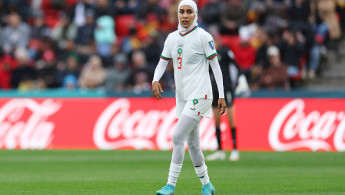French media describes Moroccan World Cup player's hijab as 'regression' in women's rights
While the world is celebrating Moroccan player Nouhaila Benzina's outstanding performance in the 2023 Women's World Cup, French media seems to be more concerned over one of the players wearing a headscarf and how it might cause a setback in women's rights.
"With her hijab, she is telling to her teammates you are immodest. [The wearing of the hijab by a player at the Women's World Cup] is an incredible regression," Philippe Guibert, a journalist on French channel Cnews, said during a debate on Sunday.
Titled "Headscarf: Is FIFA Right to Remove the Ban?" the French news channel held on Sunday, 30 July, a round table on the consequences of wearing the headscarf in football games, targeting mainly Moroccan football player Nouhail Benzina.
The 25-year-old defender Benzina became the first player to wear the hijab during a senior Women's World Cup (WWC) game when she started her team's 1-0 victory against South Korea on Sunday.
In 2007, FIFA banned the hijab from being worn during international matches, citing safety reasons.
The ban was lifted in 2014 before Muslim players wore the headscarves for the first time in a FIFA event during the 2016 Under-17 Women's World Cup in Jordan.
Meanwhile, France's top administrative court upheld last month a ban on women football players wearing Islamic hijab headscarves in games.
Philippe Guibert sur le port du hijab par une joueuse à la Coupe du monde féminine de football : «C’est une régression incroyable», dans #HDPros pic.twitter.com/eexVZB177f
— CNEWS (@CNEWS) July 30, 2023
"The court found a French Football Federation (FFF) rule against any sign or clothing clearly showing political, philosophical, religious or union affiliation during play to be appropriate and proportionate," stated the court's decision.
A group of Muslim women footballers called the "Hijabeuses" (Hijabis) had launched action against the FFF regulation, but nothing has changed.
In line with France's laws on laïcité (secularism), it is illegal to wear overt symbols of religion – including the Muslim headscarf – in government buildings, including schools.
Public officials such as teachers, firefighters or police officers are also barred from wearing any overt symbol of their religion at work.
Set to host the Olympic games next year, the debate around wearing headscarves during games is already brewing in the laïcité-obsessed country.
Secularism is a sensitive topic in France, presented by its defenders as a way of guaranteeing the state's religious neutrality and by critics as a dog whistle against ethnic and religious minorities, especially Muslims.





 Follow the Middle East's top stories in English at The New Arab on Google News
Follow the Middle East's top stories in English at The New Arab on Google News


